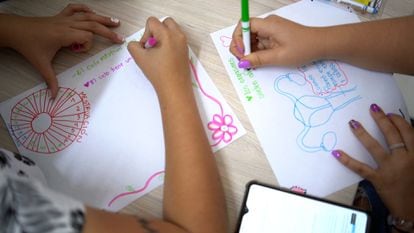Girls and adolescents participate in a workshop on menstrual education in various regions of Medellín, Antioquia.
Medellín is becoming the epicenter of a central discussion for Colombian women: the reduction of menstrual poverty. In a neighborhood of the fifth commune of the city the Menstruating Princesses group operates, which does pedagogy in different countries of Latin America; There are a number of local entrepreneurs who design cups, absorbent pants or reusable towels that are friendly to the environment and now Comfama, a family compensation fund (a social company that handles workers' contributions) launched the first menstrual subsidy in Colombia.
“We wanted to open a conversation about what it means to menstruate, seeking to demolish myths, naturalize and dignify something that happens to half of humanity once a month.
You menstruate differently depending on the social context and there are enormous barriers to access ”, says Juana Botero, lawyer, head of the Management Staff at Comfama and a menstrual educator.
The figures of this inequality are alarming: in Colombia there are 683,000 women who cannot access hygiene items for the days of menstruation and 312,000 people do not have access to clean and private toilets.
But, in addition, a Colombian must spend each year about 180,000 pesos (about 45 dollars) on towels or tampons, which represent a fifth of the minimum wage in Colombia.
In the country, three bills focused on menstrual health are being discussed, one aims to deliver products to women deprived of liberty, another of an educational nature and one more to grant menstrual licenses.
But none have made progress and there are no national government initiatives to alleviate what Botero calls "menstrual poverty."
The one in Medellín is a private initiative that, in principle, only covers the affiliates of the compensation fund, but it has already aroused the interest of other companies that want to replicate the model.
It started as a relief for 2,700 girls and adolescents between the ages of 12 and 18 but was extended to all the women in that compensation box to access cups, reusable towels and absorbent pants.
However, taboos persist.
"In some cases, when they go to claim the subsidy, the parents do not want them to redeem it for the menstrual cup because they believe that with it they lose their virginity," says Botero.
And it is not the only myth.
In the education workshops of the project, led by Princess Menstruating Emancipatory Menstrual Education, they have found cases in which girls are still punished and hidden while bleeding or told that they are dirty from menstruating.
At the First Latin American Meeting on Menstrual Education that was held in Medellín this year, Carolina Ramírez, from Princesas Menstruantes, assured that “menstruation has been reduced to a hygienic crisis” and “used as a control and oppression mechanism”.
"The menstrual taboo is an expression of misogyny and like all misogyny it kills," she said. "This is the case of the girl Jackline Chapnego who committed suicide (in Kenya) in 2019 after her teacher shamed and humiliated her by calling her dirty and forcing her to show the stain on her uniform," said Ramírez. His collective, born in the city, is recognized in Latin America for building pedagogical and literary tools to address menstrual education.
Added to the lack of access and the myths surrounding the natural act of menstruation is added the “information gap” about the products that women have historically used.
"We know very little about the options for our menstrual management and we have been introducing petroleum products into our vaginal canal for years," says Botero, who trained as a menstrual educator at Feminarian, a school in Spain.
That is why the Medellín project promotes sustainable and reusable alternatives.
Considering that, on average, each person will menstruate 2,700 days of his life or the equivalent of 7.4 years, “it is“ important to consider the footprint that the waste of traditional menstrual management products leave on the earth (between 500 and 800 years is what it may take time for towels or tampons to biodegrade) ”, say the promoters of the subsidy.
Since November, workshops have been held with girls and adolescents on menstrual education in various regions of Medellín and Antioquia Courtesy Comfama
This is where other women's initiatives come in who have created companies of environmentally friendly products.
Vera Cup, WAM, Somos Martina or Bloom are some of the local ventures that are part of the alliance in Medellín.
As well as other traditional sanitary napkin companies like Nosotras that now have a line of absorbent underwear.
Juliana Martínez Londoño, former secretary of the women of Medellín, says that the city is being a pioneer in the country by giving the discussion from the State, but also from civil society.
During the pandemic, the Mayor's Office conducted a pilot menstrual education program that seeks to reach 25,000 women and delivered menstrual cup kits.
The initiative was embodied in the city's Development Plan and is also part of the proposals of the Medellín Women movement that future candidates for Congress and the Presidency will have to attend to.
“The most important thing is that talking about menstrual education opens the door for us to have another lot of conversations about what it is to be a woman,” says Botero, one of the women behind the subsidy and the conscious menstruation program.
Subscribe here to the
EL PAÍS América
newsletter
and receive all the informative keys of the current situation in the region.

